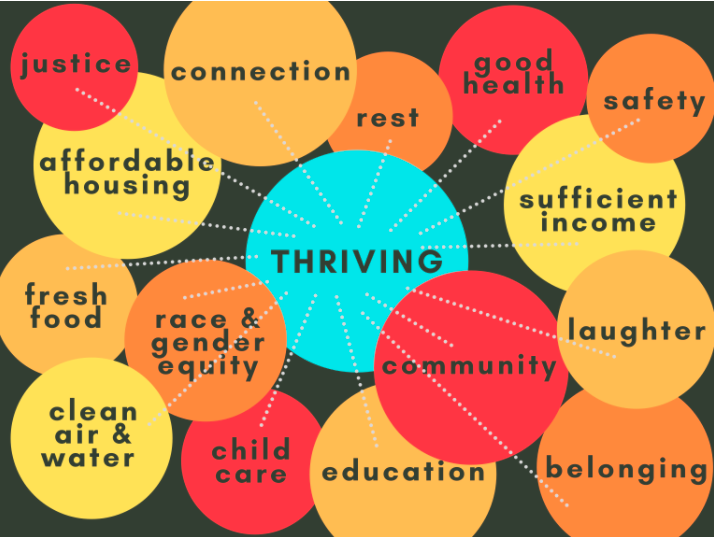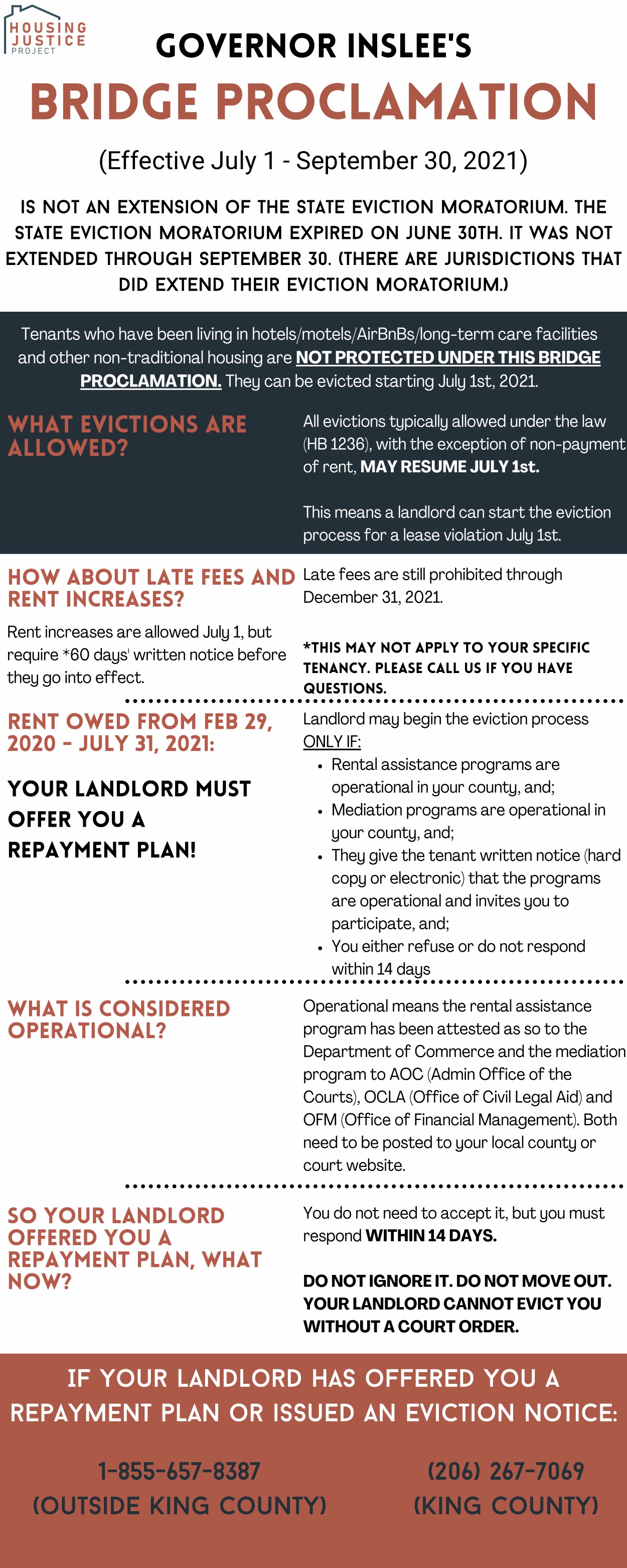Update on Governor Inslee's Bridge Proclamation
Governor Inslee just announced a Bridge Proclamation effective July 1 – September 30, 2021. This is not an extension of the state eviction moratorium which expired on June 30. It was not extended to September 30. There are also jurisdictions that did extend the eviction moratorium including King County, Seattle, Kirkland, Kenmore and Burien.
Governor Inslee’s official press release with link to the full proclamation.
Graphic courtesy of Housing Justice Project:
Building the Freedom to Thrive
By: Caroline Lopez

As we closed out the month of June, I am reminded of the many celebrations where I felt joy and fulfillment. June is Pride month. Belated Happy Pride to us all! This celebration came in many forms, from texts, zoom backgrounds, to virtual dance parties. This year Juneteenth became a national holiday where I was thrilled to engage in my first outdoor festival since the pandemic and being fully vaxxed. This was followed the day after by a beautiful Father’s Day celebration with my family. June is also National Immigrant Heritage Month, where I had the pleasure of celebrating both mine and my partner’s families, and the journeys they took which shape the lives we live today. And we celebrated the start of Summer! Hooray!
All of us hold many celebrated identities. As Anna Castro, Manager of Solidarity Is talks about in this piece, some of us also hold identities which are also feared and/or rejected by others. June is a great example of a month where one person can hold all the identities listed above and experience many very different and opposing emotions at once. This is the case for people who have been historically and deliberately excluded from the resources that offer the opportunity to thrive.
Since the colonization of Turtle Island (later named the United States of America), institutionalized racism has been used to exclude non-white people and immigrants from equal resources. Beyond that, settlers subjected those same communities to violence, slavery, and destitution. Before colonials arrived, indigenous peoples cared for the land and shared resources as well as responsibilities to take care of their communities, particularly their elders. Community respect and resourcing was similar for the indigenous peoples in West African countries before they were stolen, taken to the United States and enslaved. There is a direct connection with how non-dominant people were treated throughout history and the oppressive and violent systems that function today. These oppressions include and are not limited to racism, particularly anti-blackness, xenophobia, sexism, ableism, ageism, classism, homophobia, transphobia, size-ism, and religious prejudice. Many of these are encompassed in the term “structural intersectionality” coined in 1989 by Dr. Kimberle Crenshaw, through her research on the intersectional issues of Women of Color.
We are at a moment where we not only have data that these inequities exist but can see how people with multiple identities experience multiple forms of oppression. Due to these systems, too many people do not have the same opportunities to thrive as people from the dominant culture. When you take a look at the graphic above, imagine how it would feel to not have access to each one of the words connected to “thriving.” Imagine living in Flint, Michigan without clean and safe water to drink, cook, or wash with for years without end. Where the government ignores your demands for water not poisoned by lead. Imagine not having generational wealth to live in a neighborhood with a resourced school, where you or your parents have to work multiple jobs and never get sufficient rest or afford adequate childcare. Imagine not having truly affordable housing or safety in your own home. Would you be able to thrive in these conditions?
Focusing on one system is not enough. The Housing Action Fund works to ensure that everyone can live in a safe, healthy, affordable home, however housing alone is not enough to thrive. As we continue to build our housing justice movement and learn more deeply from people impacted by social injustices, it is imperative that we support issues, budgets and initiatives that can reinforce the capacity of low-income people to complete all the connections toward building a healthy and thriving life.
We can start by acknowledging this country’s history, deconstructing our unconscious bias, move away from individualism, move toward community care, and be kind to ourselves and others throughout this process. Take time to look at your own multiple identities and invite people with different identities into conversation. Be intentional about adding historically excluded people to decision making bodies in your organizations, coalitions, and movement work. Jorge Gutierrez, Director of Familia: Trans Queer Liberation Movement spoke on his experience of intersectional movement work for Trans Immigrant Rights in this week’s Solidarity Is This podcast. He was asked what it would look like for an LGBTQ immigrant to arrive in an ideal movement space. “I imagine an LGBTQ immigrant walking into a community center. Someone welcomes them and asks them, ‘How are you? How can I help you? Here’s a meal to get you started.’ There’s a menu that gets rolled out. ‘Where do you want to live? What kind of job would you like? How far do you want to travel? What kind of services would you like? What brings you happiness? So that this person can feel fully seen, that it’s not about charity, right? It’s about giving opportunities and possibilities so that folks can make their own decisions about where they want to live, what kind of job do they want, and what will bring them joy and happiness…. This goes beyond a piece of paper… that limits our creativity and our approach to organizing in this country.”
This is a time of visioning, transformation and working to build ideal movement spaces that include and celebrate peoples’ multiple identities and accounts for everything people need to have the freedom to thrive.
The term “historically excluded” is credited to Dr. Kelebogile Zvobgo.
Article on structural intersectionality: Black History Month: What is Intersectionality?
The opening to this article was inspired by this piece by Anna Castro: Celebrate Our Demands: Acting in Solidarity with LGBTQ Immigrants Beyond Pride Month
Information on the Washington Black Trans Task Force who, among other social justice issues, works to provide housing and services for the Black Trans Community in the Seattle-Tacoma area.
The Importance of Local Elections: Burien City Council Approves Permanent Supportive Housing
By Caroline Lopez
In 2019, Burien council members voted on a policy to create the Affordable Housing Demonstration Program to meet the needs of historically excluded populations, such as low-income people and people without homes. This granted zoning variances to projects that serve people with zero to low income. DESC, a supportive housing, homelessness services and shelter non-profit had proposed a project for a permanent supportive housing building in Burien. This 95-unit building would be for adults with disabilities who have experienced long-term homelessness, are highly vulnerable and earn less than $23,350 (30% AMI).
Testimonies were heard from supporters and non-supporters of this project. Some Burien residents were concerned that the building would be “importing crime.” Deputy Mayor, Krystal Marx who has lived experience of homelessness remarked that statements like that “liken ALL crime in Burien to folks experiencing homelessness.” In a South Seattle Emerald article, she called the project “almost a relief valve for the system, where Burien has been sending these folks to places like Seattle for years because we haven’t had support services to take care of folks.”
On June 21, 2021 the Burien City Council voted 6-1 to move forward with this project. There was an amendment added to have 30% of the building prioritized for Burien residents when it opens. Burien will now be able to offer supports they never could before.
In addition to approving DESC’s permanent affordable housing project, the Burien City Council announced that they would extend the eviction moratorium to the end of September 2021. Many residents have not yet had access to rental assistance needed to help payoff rental arrears due to the pandemic. This extension offers them time to recover and relief from going through a traumatic eviction process. The city was one of a handful including Seattle, Kirkland, and Kenmore who took this initiative before Governor Inslee made his announcement to extend the eviction moratorium on June 29, 2021.
We are excited for the residents of Burien who are taking a multi-solution approach to the housing crisis. These housing and homelessness measures, policies, and funding pass through the votes of local elected officials.
Local elections matter! For more information on how you can volunteer to support local candidates who care about housing justice, please fill out this form.
2021 Endorsements Update
The Housing Action Fund sent invitations out for specific local races in early June 2021. The deadline for submission was last week. The Endorsement Committee is currently reviewing questionnaires. Candidates who requested an endorsement will be notified by mid-July. The committee will likely hold off on endorsing in some races until the General Election and may decide not to weigh in on some races depending on candidate answers.
If you have any questions, please contact Caroline Lopez at carolinel@housingactionfund.org.
For more information on 2021 endorsements, please visit our webpage.
Membership Drive: Join our Movement!
As a part of our extended network of advocates across Washington state, you’re already a big part of advancing the movement for housing justice. Today we’re inviting you to deepen that impact by joining the Housing Action Fund as a member if you haven’t already. Join before the end of our membership drive on July 7, and we’ll send you a vinyl sticker in the mail that you can use to show off your commitment to housing justice! Image of sticker below:
- wahousingaction's blog
- Log in to post comments

